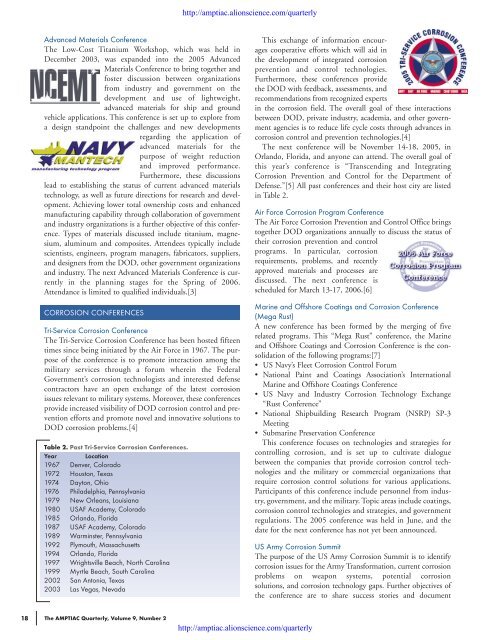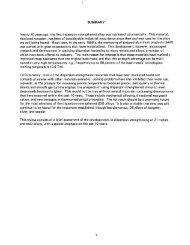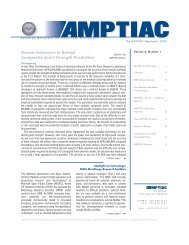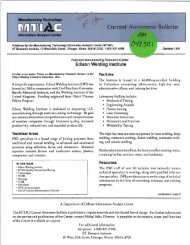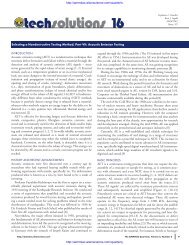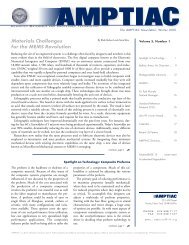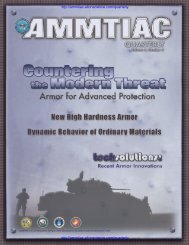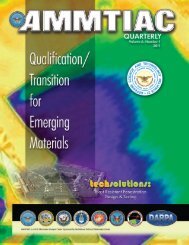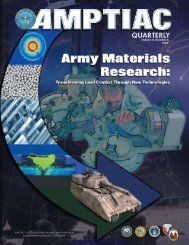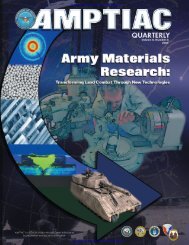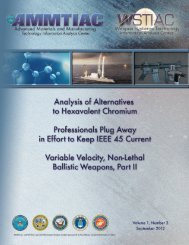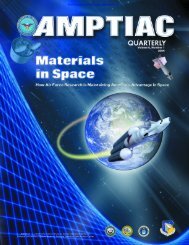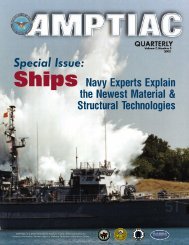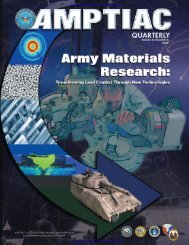AMPTIAC Quarterly, Vol. 9, No. 2, Summer/Fall 2005 - Advanced ...
AMPTIAC Quarterly, Vol. 9, No. 2, Summer/Fall 2005 - Advanced ...
AMPTIAC Quarterly, Vol. 9, No. 2, Summer/Fall 2005 - Advanced ...
Create successful ePaper yourself
Turn your PDF publications into a flip-book with our unique Google optimized e-Paper software.
<strong>Advanced</strong> Materials Conference<br />
The Low-Cost Titanium Workshop, which was held in<br />
December 2003, was expanded into the <strong>2005</strong> <strong>Advanced</strong><br />
Materials Conference to bring together and<br />
foster discussion between organizations<br />
from industry and government on the<br />
development and use of lightweight,<br />
advanced materials for ship and ground<br />
vehicle applications. This conference is set up to explore from<br />
a design standpoint the challenges and new developments<br />
regarding the application of<br />
advanced materials for the<br />
purpose of weight reduction<br />
and improved performance.<br />
Furthermore, these discussions<br />
lead to establishing the status of current advanced materials<br />
technology, as well as future directions for research and development.<br />
Achieving lower total ownership costs and enhanced<br />
manufacturing capability through collaboration of government<br />
and industry organizations is a further objective of this conference.<br />
Types of materials discussed include titanium, magnesium,<br />
aluminum and composites. Attendees typically include<br />
scientists, engineers, program managers, fabricators, suppliers,<br />
and designers from the DOD, other government organizations<br />
and industry. The next <strong>Advanced</strong> Materials Conference is currently<br />
in the planning stages for the Spring of 2006.<br />
Attendance is limited to qualified individuals.[3]<br />
CORROSION CONFERENCES<br />
Tri-Service Corrosion Conference<br />
The Tri-Service Corrosion Conference has been hosted fifteen<br />
times since being initiated by the Air Force in 1967. The purpose<br />
of the conference is to promote interaction among the<br />
military services through a forum wherein the Federal<br />
Government’s corrosion technologists and interested defense<br />
contractors have an open exchange of the latest corrosion<br />
issues relevant to military systems. Moreover, these conferences<br />
provide increased visibility of DOD corrosion control and prevention<br />
efforts and promote novel and innovative solutions to<br />
DOD corrosion problems.[4]<br />
Table 2. Past Tri-Service Corrosion Conferences.<br />
Year Location<br />
1967 Denver, Colorado<br />
1972 Houston, Texas<br />
1974 Dayton, Ohio<br />
1976 Philadelphia, Pennsylvania<br />
1979 New Orleans, Louisiana<br />
1980 USAF Academy, Colorado<br />
1985 Orlando, Florida<br />
1987 USAF Academy, Colorado<br />
1989 Warminster, Pennsylvania<br />
1992 Plymouth, Massachusetts<br />
1994 Orlando, Florida<br />
1997 Wrightsville Beach, <strong>No</strong>rth Carolina<br />
1999 Myrtle Beach, South Carolina<br />
2002 San Antonia, Texas<br />
2003 Las Vegas, Nevada<br />
This exchange of information encourages<br />
cooperative efforts which will aid in<br />
the development of integrated corrosion<br />
prevention and control technologies.<br />
Furthermore, these conferences provide<br />
the DOD with feedback, assessments, and<br />
recommendations from recognized experts<br />
in the corrosion field. The overall goal of these interactions<br />
between DOD, private industry, academia, and other government<br />
agencies is to reduce life cycle costs through advances in<br />
corrosion control and prevention technologies.[4]<br />
The next conference will be <strong>No</strong>vember 14-18, <strong>2005</strong>, in<br />
Orlando, Florida, and anyone can attend. The overall goal of<br />
this year’s conference is “Transcending and Integrating<br />
Corrosion Prevention and Control for the Department of<br />
Defense.”[5] All past conferences and their host city are listed<br />
in Table 2.<br />
Air Force Corrosion Program Conference<br />
The Air Force Corrosion Prevention and Control Office brings<br />
together DOD organizations annually to discuss the status of<br />
their corrosion prevention and control<br />
programs. In particular, corrosion<br />
requirements, problems, and recently<br />
approved materials and processes are<br />
discussed. The next conference is<br />
scheduled for March 13-17, 2006.[6]<br />
Marine and Offshore Coatings and Corrosion Conference<br />
(Mega Rust)<br />
A new conference has been formed by the merging of five<br />
related programs. This “Mega Rust” conference, the Marine<br />
and Offshore Coatings and Corrosion Conference is the consolidation<br />
of the following programs:[7]<br />
• US Navy’s Fleet Corrosion Control Forum<br />
• National Paint and Coatings Association’s International<br />
Marine and Offshore Coatings Conference<br />
• US Navy and Industry Corrosion Technology Exchange<br />
“Rust Conference”<br />
• National Shipbuilding Research Program (NSRP) SP-3<br />
Meeting<br />
• Submarine Preservation Conference<br />
This conference focuses on technologies and strategies for<br />
controlling corrosion, and is set up to cultivate dialogue<br />
between the companies that provide corrosion control technologies<br />
and the military or commercial organizations that<br />
require corrosion control solutions for various applications.<br />
Participants of this conference include personnel from industry,<br />
government, and the military. Topic areas include coatings,<br />
corrosion control technologies and strategies, and government<br />
regulations. The <strong>2005</strong> conference was held in June, and the<br />
date for the next conference has not yet been announced.<br />
US Army Corrosion Summit<br />
The purpose of the US Army Corrosion Summit is to identify<br />
corrosion issues for the Army Transformation, current corrosion<br />
problems on weapon systems, potential corrosion<br />
solutions, and corrosion technology gaps. Further objectives of<br />
the conference are to share success stories and document<br />
18<br />
The <strong>AMPTIAC</strong> <strong>Quarterly</strong>, <strong>Vol</strong>ume 9, Number 2


